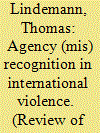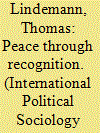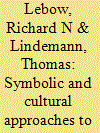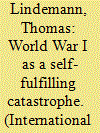| Srl | Item |
| 1 |
ID:
162496


|
|
|
|
|
| Summary/Abstract |
This contribution introduces a reconceptualisation of misrecognition that stresses ‘creative agency’ (gift, work, etc.) as a condition of self-consciousness. Drawing on Hegel’s The Phenomenology of Spirit, I argue that recognition struggles are often less motivated by the actors’ desire to have a special status than by the desire to make a ‘contribution’ to society, to ‘give’ something. The content of a socially valued contribution-gift (as per Marcel Mauss) varies from one society to another but it is linked to the very ability of actors to act on their ‘own’ and to shape their environment. Thus, subjects identifying with political units or social groups with little recognised agency, while imagining strong abilities to contribute to a given society, will easily feel slighted. It is impossible to be recognised as ‘subjects’ if one is denied in the ability to ‘contribute’ to a given society. I apply this perspective to the case of French jihadism, based on 13 interviews with prisoners in France suspected to belong to al-Qaeda or the Islamic State. These individuals experience ‘individual’ agency denial inside the ‘national’ community, but also agency denial of ‘Muslim sovereignty’ outside.
|
|
|
|
|
|
|
|
|
|
|
|
|
|
|
|
| 2 |
ID:
102952


|
|
|
| 3 |
ID:
132919


|
|
|
|
|
| Publication |
2014.
|
| Summary/Abstract |
This forum offers a symbolic and cultural approach for understanding the outbreak of World War I that stresses the interactional and symbolic-cultural aspects of German decision makers' brinkmanship during the July crisis of 1914. Contrary to excessive structuralist accounts, the contributions focus on what actors 'do' and 'feel' during a crisis. In the German-Austrian case, symbolic interactions during the July crisis were strongly marked by challenges to the 'face' of decision makers. The second theme of the Forum is to question the purely 'material' nature of those structures traditionally referred to as permissive for World War I. Structures, in fact, are symbolic, too. Like theories on status discrepancy, the Forum stresses the impact of 'responsibility gaps'. However, the contributors also point to the emotional aspects and internal legitimacy problems caused precisely by those status lags.
|
|
|
|
|
|
|
|
|
|
|
|
|
|
|
|
| 4 |
ID:
132924


|
|
|
|
|
| Publication |
2014.
|
| Summary/Abstract |
It is a quite common conviction in international relations (IR) theory that what George Kennan called the 'original catastrophe' was predetermined and unavoidable. These explanations of World War I consider the conflict primarily as an inevitable by-product of material structures.1 On the one hand, are those who emphasize the impact of international system's constraints on state behavior - rigid alliances, bipolarization between great powers, the arms race, rivalry dynamics and so on.2 Yet, others regard countries' domestic structures as fundamental component in the outbreak of a diversionary war.3 If taken too far, these approaches can imply that the war was both rational and inevitable in that it was the logical consequence of internal and external tensions. Most importantly, these perspectives fail to take into account leaders' corresponding representations and narratives of 'material' reality and their role on the decision-making process. This essay devotes special attention to the hitherto neglected narrative dimension of World War I.4 In the following, I will propose a new interpretation for German brinkmanship during the July crisis.
|
|
|
|
|
|
|
|
|
|
|
|
|
|
|
|